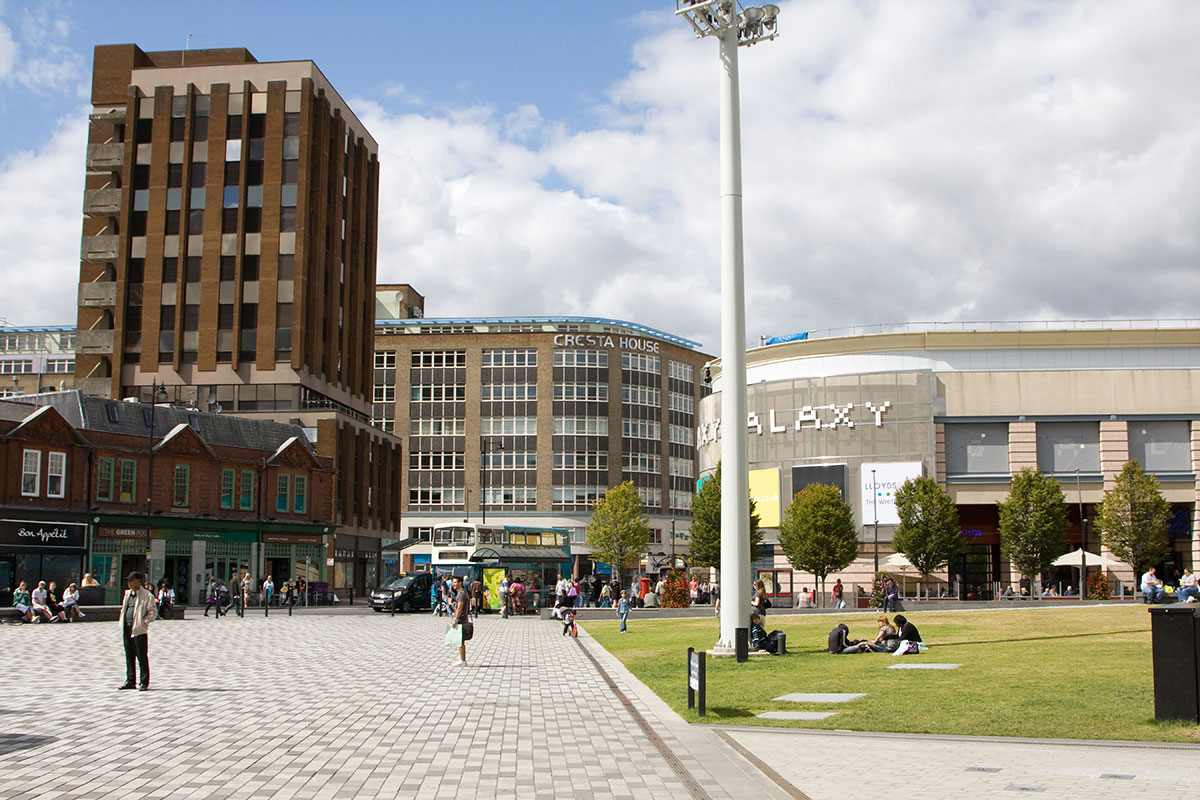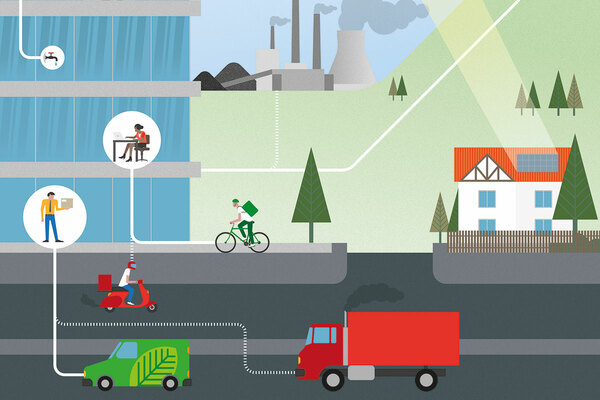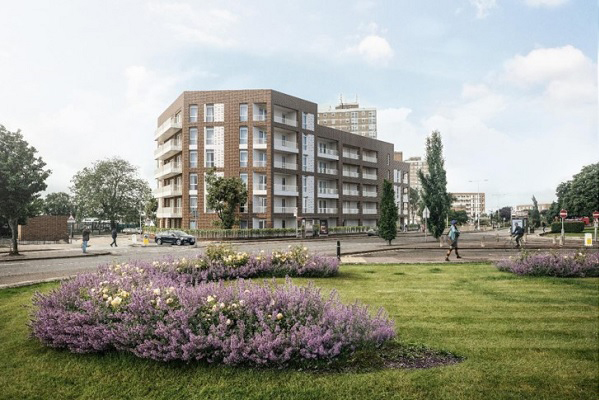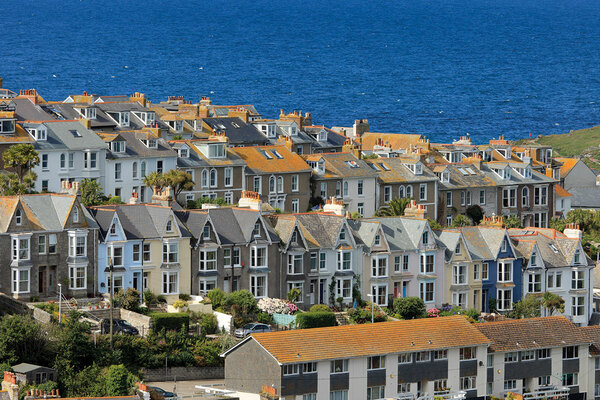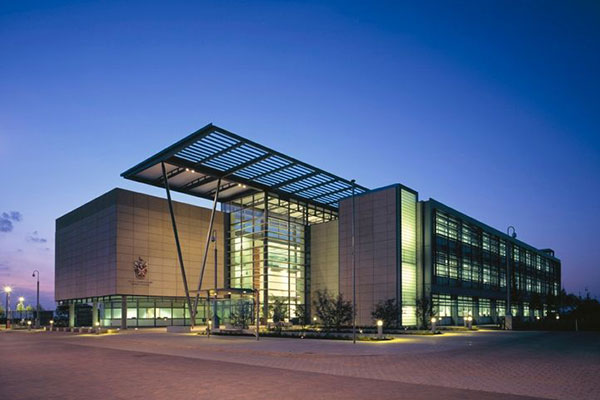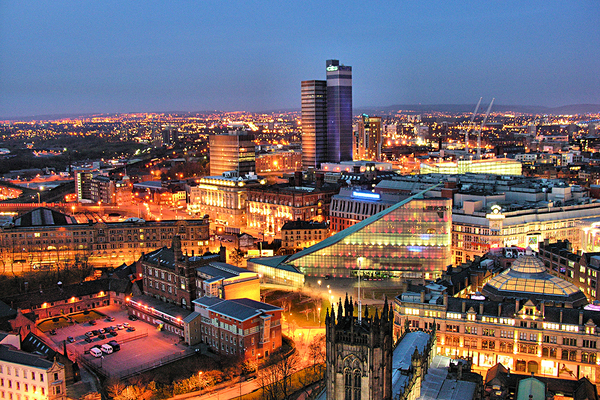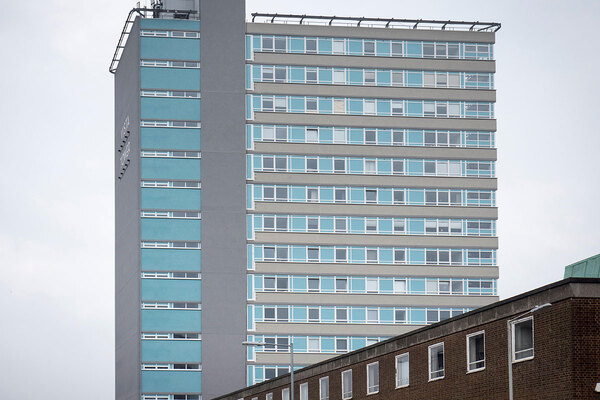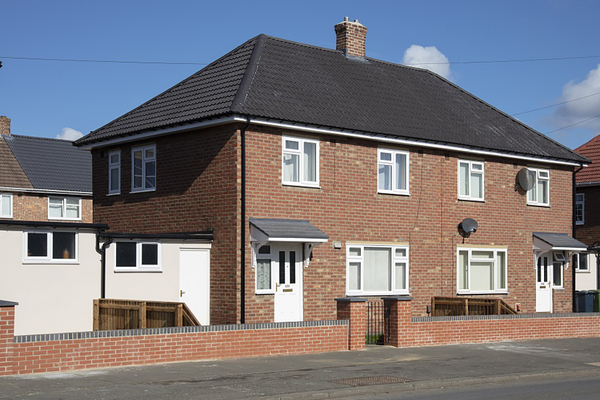You are viewing 1 of your 1 free articles
What does the declaration of a climate emergency by councils mean for housing?
Councils across the UK are declaring a climate emergency. So what does this mean for their policies and procurement processes? Peter Apps finds out. Picture by Alamy
When the government next runs into trouble with Extinction Rebellion protesters, it might want to give Tom Shaw, cabinet member for housing at Luton Borough Council, a call for advice.
“I got a thank you card off them recently, saying thanks for working alongside us,” he says. “People object to Extinction Rebellion, but we have found them co-operative and good at suggesting ideas.”
Luton is one of more than 250 councils to have declared a climate emergency since 2018 – more than 60% of all the councils in the UK. While to a sceptic this may seem like grandstanding, it is actually set to drive major changes to local government businesses – with particular implications for housing.
So what does the declaration of a climate emergency actually mean? In most cases it is an undertaking to make environmental considerations a part of all council decision-making. Specific targets are also likely to be set to make the council’s operations and the entire local area carbon neutral (typically by 2030 and 2050 respectively – although some are more ambitious).
Most councils will have been doing some work in this area anyway – but the declaration is likely to speed it up. “It’s not as if we’ve suddenly realised it’s an issue,” says Gordon Jackson, chair of the climate change and innovation board at Guildford Council. “But the declaration gives us new impetus for looking at everything we do with a view to reducing our emissions as quickly as we can.”
This then has very specific implications for the housing sector, particularly in three ways: planning, the management of existing housing and procurement.
Barking and Dagenham
A new development in Becontree Heath, Barking, by the council's delivery arm BeFirst (picture: BeFirst)
Region: Greater London
Declared climate emergency: January 2020
Impact for housing: A greenhouse gas emissions study will feed into a revised draft local plan that is likely to require developers to maximise on-site carbon reduction features in new developments. The council is seeking to be carbon neutral through its own operations by 2050.
Its 17,500 social homes will be improved through the £3.6m Retrofit Accelerator programme. It is delivering insulation and heating upgrades and is trialling an ‘Energiesprong’ deep retrofit on 20 council homes – designed to bring homes from Energy Performance D, E, F and G up to A-grade, as well as fitting renewable energy sources. The study will also look to make its procurement process more sustainable.
First, as a planning authority, councils set the rules for new developments in their area. Many of the climate emergency councils are now committing to adopting more demanding standards for the carbon efficiency of new build, through an updated local plan or supplementary planning guidance. In the snap survey, 24 of the 29 were either considering passing such a measure or had done so already, and the five which hadn’t did not ruled it out – they were just too early in the process to have made specific plans.
This development may have set councils on a collision course with central government. Concerned about the impact on developers and worried about the piecemeal development of housing standards across the country, the government is currently consulting on proposals “which would restrict local planning authorities from setting higher energy efficiency standards for new homes”.
Cornwall
Cornwall has more than 90,000 solid-wall homes which need better insulation (picture: Getty)
Region: South West
Declared climate emergency: January 2019
Impact for housing: The council is developing a Climate Change Development Plan Document, which will require future development to be more energy efficient, powered by renewables and mindful of the impact on coastal areas and floodplains. No new build council housing will be connected to fossil fuel power sources.
The council also has funding to run a ‘Whole House Retrofit’ programme on 83 social homes in the county, which seek to reduce running costs by 20% and emissions by 80%. It is seeking further funding for retrofit – with some 90,000 solid-wall homes in the county (all tenures). The council is also altering its supply chain to reduce its carbon footprint.
Currently they are entitled to 19% more in carbon reductions above the level set in building guidance but are discouraged from going further.
This has riled local politicians.
“It should be a case of standards being pushed up by national government, not being held back,” says Hazel Smith, lead cabinet member for housing at South Cambridgeshire Council.
South Cambridgeshire
South Cambridgeshire Council's retrofit measures have already saved 4,000 tonnes of carbon (picture: South Cambridgeshire Council)
Region: East of England
Declared climate emergency: December 2019
Impact for housing: South Cambridgeshire has some of the highest growth in terms of new development in the country and believes “ensuring that planning policy is as stringent as possible in supporting carbon reduction is of the utmost priority”. As a result, it is preparing supplementary planning guidance which will set higher standards for developers of new housing in the area. It is also working to embed placemaking policies into this document which will require new areas to be developed in a way which allows people to live a low-carbon lifestyle.
As a landlord, it has 5,300 social homes which have an average energy band rating of C. It is working to convert the lowest-performing properties to a higher rating. It has also set out a five-year capital spending plan which involves investment in heating systems and insulation – measures which are estimated to have already saved 4,000 tonnes of CO₂ emissions. It is also altering its contract regulations to require suppliers to provide evidence that they are monitoring and reducing CO₂ emissions.
She says that developers she has spoken to welcome the move. “For them it’s a selling point,” she says. “They understand the value in being able to build new homes for the future.”
In Luton – which has a target of reaching carbon neutral across the whole area by 2035 – Mr Shaw says he is hoping a redrafted local plan will demand ‘Code Four’ homes in all new developments. For those uninitiated to sustainability jargon, that is level four out of six on the Code for Sustainable Homes grading lists and sets higher standards than national regulations require across areas, covering CO₂ emissions, water use and waste among other factors.
Dacorum
Dacorum’s Longlands block in Adeyfield after refurbishment. The council declared a climate emergency in June last year
Region: East of England
Declared climate emergency: June 2019
Impact for housing: Dacorum is preparing a new local plan and is considering planning policies to reflect its environmental commitments - such as directing development to sustainable locations and more stringent construction standards.
As a landlord of around 10,000 homes, it has commissioned a survey to model the baseline energy performance, which will help identify the homes most in need of work. A number of measures have already been taken to improve its energy performance. With regard to procurement, its repairs contract with Osborne Property Services requires the contractor to include an indicator of the environmental impact of its activities. It will continue to review procurement rules as part of its action plan.
Mr Shaw says that he would be “completely opposed” to the government ordering it to set lower standards, but that it will ultimately be a matter for the planning inspectorate.
In Guildford, the council has required a 20% reduction in carbon emissions for new development in its local plan. Mr Jackson says it will toughen these standards “as aggressively as it is possible to” but acknowledges the “trade-off” between sustainability and viability. “We do want homes to be built,” he adds.
Guildford
Guildford is considering adopting tougher planning rules (picture: Getty)
Region: South East
Declared climate emergency: July 2019
Impact for housing: A new local plan adopted last year requires a 20% reduction in carbon emissions for new build, and standards could potentially get tougher if the council deems it necessary. The council’s planning guidance places an emphasis on a ‘fabric first’ approach – which means maximising the performance of the materials which make up the structure of the building.
The council owns around 5,000 social homes and is focusing on replacing heating systems at the 80% reliant on gas boilers to more sustainable systems such as air source heat pumps where possible and retrofitting homes which are less energy efficient. It is also reviewing its procurement policies to require suppliers to demonstrate their sustainability credentials.
What about existing housing stock? All 18 councils that responded to Inside Housing’s survey which owned stock said they were planning to work on improving their environmental performance.
Much of this work involves retrofitting insulation – councils are commissioning surveys to establish the worst-performing homes in their stock and prioritising them for retrofit. There are also large programmes under way that involve the installation of renewable energy sources such as ground source heat pumps and solar panels. This work can attract private investment – particularly the energy generation – but the retrofit is expensive. Councils are directing resources from their Housing Revenue Account – but this is not a limitless resource.
Luton
Region: East of England
Declared climate emergency: January 2020
Impact for housing: The council is working on a new local plan and could seek to demand that developers meet the exacting ‘Code 4’ standard under the Code for Sustainable Homes – a step that would require developers to go significantly in excess of the building regulations.
The council has also committed £40m to improve the thermal efficiency of its tower blocks and £1.2m a year from its Housing Revenue Account to fund energy efficiency improvements to council stock.
The council is also seeking to lift standards in the private rented sector by making energy efficiency a condition of its landlord licensing scheme.
“Money is always the challenge at local authority level,” says Mr Jackson. “I can’t see the retrofit of properties happening on a grand scale without government funding.”
There is also the question of non-council stock. In some areas, such as Glasgow, programmes offer low-cost or subsidised retrofit programmes to the private sector. In others, such as Luton, councils are exploring using new landlord licensing schemes to force private landlords to improve properties.
Manchester
Manchester is aiming to be carbon neutral by 2038 (picture: Getty)
Region: North West
Declared climate emergency: October 2019
Impact for housing: The council’s local plan is about to undergo a review, which is likely to include new standards for sustainable building as it strives to meet a target of making the city carbon neutral by 2038.
The council owns 16,000 of the 68,000 social homes in the city, which are managed by ALMO Northwards Housing. Over the past five years 1,500 solar panels have been installed and further retrofitting is planned.
With regard to procurement, the council has adopted specific carbon reduction questions – which examine suppliers’ organisational approach to carbon reduction and how it will be applied to the contract. It will apportion 10% of the overall evaluation of the bid to this scoring.
Finally, councils are adjusting their procurement policies. Local authorities are large businesses and spend billions on goods and services – from printer toner to major repairs contracts. Increasingly, they are setting rules within the procurement process which demand that suppliers demonstrate a commitment to sustainability. Manchester has recently resolved to make carbon reduction worth 10% of the scoring for new tenders.
“As with many, many areas we’re reviewing our procurement as a direct result of the climate emergency declaration,” says Mr Jackson. “You want to see that suppliers have their own sustainability policies.”
Glasgow
Glasgow City Council runs an affordable warmth project (picture: Getty)
Region: Scotland
Declared climate emergency: May 2019
Impact for housing: All planning applications for new housing in the city have had to meet ‘Building Standards Technical Handbook Gold Level Compliance plus 20% Low and Zero Carbon Generating Technologies’ since September 2018. These standards require homes to be energy efficient and include measures for renewable energy use.
While Glasgow does not own social housing directly, it has worked with local housing associations on schemes aimed at making the social housing stock in the city more energy efficient. It also has an affordable warmth project – aimed at the lowest-income areas of Glasgow and open to homeowners and private landlords – to help make homes more energy efficient.
So those selling to councils in the coming years, be advised: get green or lose out.
Overall these policies will be small steps along the path we need to take as a society to avert the looming crisis. But they are steps. It is now for central government to decide whether it wants to help turn them into leaps or put barriers in the way.
Sign up for our Council Focus newsletter
Already have an account? Click here to manage your newsletters
